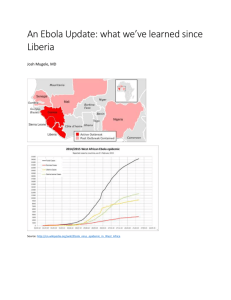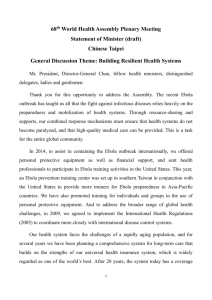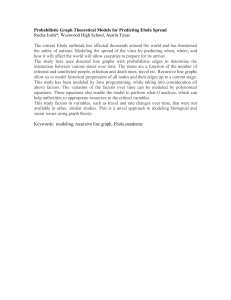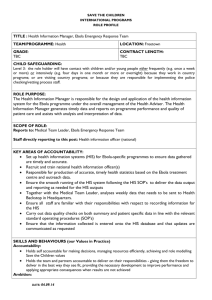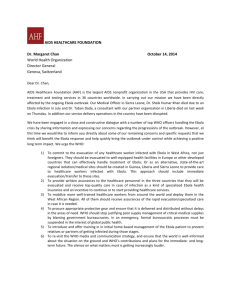AGRI-411: Global Issues on Development The Political Economy
advertisement
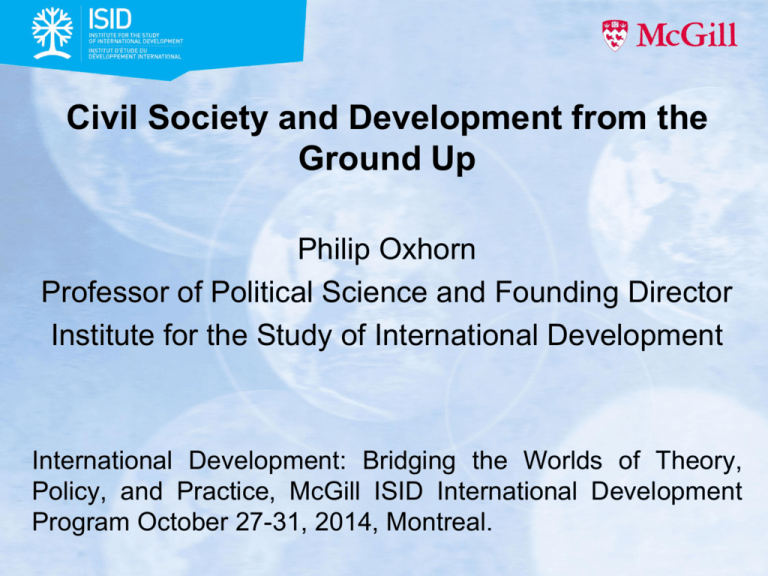
Civil Society and Development from the Ground Up Philip Oxhorn Professor of Political Science and Founding Director Institute for the Study of International Development International Development: Bridging the Worlds of Theory, Policy, and Practice, McGill ISID International Development Program October 27-31, 2014, Montreal. Introduction Insights from the Ebola Crisis A Microcosm of Development Challenges Focal Point: Liberia, Sierra Leone and Guinea • Among the poorest countries in the world • Long term problems of governance and instability, including recent histories of political violence and civil war March 25: • WHO first reported 86 suspected cases in Guinea, reports of possible cases in Liberia and Sierra Leone; 60 deaths. • The first time in West Africa. • Public health Institutions weak and unprepared − 1 doctor/100,000, compared to 240/100,000 in the Us Understaffed, lack of supplies, means healthcare providers are also very vulnerable, increasingly decimating the healthcare system Insights from the Ebola Crisis(cont’d) October 15: •WHO reports 8997 confirmed, probable and suspected cases; •4493 confirmed, many of them healthcare workers •All but 24 in the 3 countries most affected. •Discovered in 1976, about 20 past epidemics, less than 300 deaths in each − Irony: development is one reason why it is so severe today The Worst is Yet to Come •WHO: 5-10,000 new cases/week by December •CDC: .4m in West Africa within next 3 months •Word Bank: Economic loss of $3.8-32.6 billion by end of 2015, or 3.3% of regional GDP Insights from the Ebola Crisis(cont’d) Development Vicious Cycle • Existing capacity quickly overrun, health personal vulnerable • Recent health gains threatened • “Easy”response is isolation: − cut off from jobs, means starvation, disruption of economic systems, inflation, closed businesses, Foreign investors… Weak Governance: just beginning to recover before crisis • Lack of Trust − Rumors, conspiracy theories − No one may believe the message if they even hear it • The New “Disappeared” • Inequality: better off people can still bury their relatives − Buying False Death Certificates • The danger of a resurgence of violence Insights from the Ebola Crisis(cont’d) Separating out necessary short term assistance from long term development •MSF cannot replace national healthcare systems Civil Society: Problem and Part of the Solution? •Cultural Practices (burials) •Filling in the Gaps when all else Fails? •Are NGOs part of civil society? What roles should they play? Paul Farmer: Despite Common Wisdom, 90% should survive •Basic medical practices: hydration and isolation •“Without staff, stuff, space and systems, nothing can be done” Insights from the Ebola Crisis(cont’d) World Response: Too little, too late? •Failure of the UN System: Ban Ki-Moon: A 20 fold surge compared to what is promised is needed •More than money, personnel is needed − 2-3 staff per hospital bed needed − US military trained in dealing with epidemics, but will not staff the centers it builds − MSF requests Australian doctors instead of pledge of funding, Australia balks − Exceptions: China and Cuba! The WHO Admits It Failed to Recognize the Risks • Weakest regional office in Africa, bu it should be the strongest given the enormity of health challenges − Technically the weakest, full of political appointments The Fundamental Development Challenges Articulating long and short term goals to create the kind of society people want Setting Priorities Ensuring Follow-through Avoiding Dependency by achieving development in the most basic sense • Access to services, including healthcare, education and old age retirement • Creating an economy that can generates resources (taxes) and employment Balancing humanitarian, short term assistance with long term development aid A Political Economy Approach The interplay of interests • Who represents who? • Who is not represented? • Who “wins,” who “loses” Development as a Public Good 3 Levels of Actors • The International System • Domestic Civil Society • The State What is “Sustainable” Development? Defining Development: Improving People’s Quality of Life in Ways They Appreciate Brundtland Commission (1987): “Development that meets the needs of the present without compromising the ability of future generations to meet their own needs.” • Standard Interpretation • Current economic activity can continue • Environment primary concern Problem: Insufficient for Majority of World’s Population • Not lifestyles but Basics: housing, water, sanitation, electricity (access to internet and cellphones!)—just building school rooms! • The Need to Create Jobs - Especially for youth • Not one-size fits all Donor Countries Resources:The Global “Haves” Responsibility? • Moral responsibility vs. Realpolitik • Cuba: long a pillar of its foreign policy, it has 670 doctors/100,000 Accountability: National Taxpayers or Beneficiaries? −The Onion: “Ebola vaccine at least fifty white people away” −Irony: it is that close only because of fears of Ebola’s weaponization −National businesses or local? Priorities • Protection of population or free flow of people and merchandise? • Buildings or Less Conspicuous Inputs for Development • Agriculture vs. urban investments Dependence and Neo-colonialism International Organizations Development Agencies (World Bank, UNDP, regional organizations) Accountable to Who? • Inequality of Representation • Coordinating multiple actors with conflicting interests - G8 vs. G20 vs. those inevitably left out - Can Brazil or Mexico represent Haiti or Honduras? - Ex.: Environmental Impasse Danger of One-Size Fits All Approaches - Ex.: Privatization and Decentralization The Threat to National Sovereignty International Civil Society Conflicting Visions and relations with local civil society • Ex.: the Environment • Problems of Representation—whose agenda? • Sustainable? - Squeezing out local alternatives (Haiti) - MSF cannot become a substitute for national healthcare systems, yet is providing 2/3s of isolation beds The Ultimate Insufficiency of all International Resources • The Need for National Development • National actors cannot be displaced Civil Society Autonomous, Self-Constituted Organizational Activity • Minimal consensus • Defines “quality of life” • Ebola: communities must decide how to reorganize their lives. Cultural change impossible without civil society Filling in the Gaps: when states do not suffice Civil Society and Development • Frequently weak in developing countries − Inequality and Exclusion (women, minority groups, the poor) • Challenge of Scope: − Community vs. national development − Self-help vs. development • Often divided, competing with one another − Capable of achieving a broad public good? Civil Society Cannot Govern The State Rule of Law • Controlling Criminal Violence • Property Rights (ex. of Haiti) Establishing and Pursuing a Sense of Public Good • Health, education, social security • Infrastructure • Citizen Rights (and obligations) Setting Priorities • Ensuring the “boring” aspects of development are not ignored Mobilizing Resources The Importance of Trust The State (cont’d) The Gate Keeper vis-à-vis the international community • States, not MSF, should insist on personnel rather than money • States should be in debates about who receives vaccines - Debate: 5 years ago, no one would demand that Africans be given untested drugs to see if they work! - More generally, if states cannot coordinate aid, set aid goals and ensure promises are kept, who will? State-Society Synergy Working with civil society to define and pursue public goods • Ex.: Education • Ex: Controlling Crime Controlling Ebola: • Makeshift clinics and training local people, especially survivors with presumed immunity in Liberia and Sierra Leone • Education campaigns and community action needed—involve churches, traditional healers and other traditional institutions. Mutual Strengthening • Aid to Civil Society Organizations (material,non-material) • Extending the reach of State Institutions (ex.: treating river blindness) The Importance of Good Governance Rule of Law vs. a Police State • The Foundation for Trust States must have institutional mechanisms for achieving state-society synergy • Transparency • Entry points for civil society (e.g., decentralization) Legitimacy • Nationally: Citizens respecting the outcomes of the political process • Internationally: Legitimate interlocutors with external actors - Appropriate recipients of international assistance Democratic Governance The Power of Popular Support and Legitimation • A member of the club of nations or a pariah state? Responsive, accountable government through active citizen participation Often achieved through elections • Easy to Learn (e.g., Iran, Afghanistan, Haiti) • Hard to Pull-off: The importance of institutions - Timing: when feasible rather than as soon as possible - A good example of conflicting interests of donors and recipient countries? Integral to achieving state-society synergy Citizenship The Substance and Universality of Rights 3 Models, 3 types of rights: civil, political and social • Citizenship as Cooptation: - Rights are unequal and segmented - Ex.: informal vs. formal sector workers • Citizenship as Consumption: • A person’s access to rights depends on their economic resources • Ex.: public education and healthcare vs. private alternatives • Citizenship as Agency • The active role played by multiple actors in defining citizenship rights • Ex.: Canada China The Exception that Proves the Rule? • • • • Spectacular Economic Growth, Decreased Poverty Strong Governance Even supplying medical personnel in West Africa! But Without Democracy A Siren Call for Would-be Autocrats? Why it is not a Model for Export • Costly Errors (Great Leap Forward, Cultural Revolution, Tiananmen Square) Before it Took Off • Increasing Calls for Accountability • When the Economy Slows? • The Absence of Regular Self-reflection Amartya Sen: Democracies Do Not Have Famines Final Thoughts Development is a long term process • Articulating long and short term goals - Disaster relief plus development • Setting Priorities External Actors, however well-intentioned, can only help, but help they must The Centrality of the State • An interlocutor with both national and international actors • Its weakness creates a vacuum • Ex.: West Africa The Need for State Society Synergy The Goal of Citizenship as Agency The Challenge of Working in Culturally Distinct Societies Civil Society’s Basic Dynamics Imposed on the “Outsider” • • • Diversity, Lack of Trust Yet the Practitioner Cannot be Part of the Minimal Consensus The Colonial Legacy Lessons from the Soup Kitchen: Chile’s Slums, 1986 • Cultural Sensitivity, Respect and the Earning of Trust Knowing Your Place and Potential Contribution Two Extremes in Local Perceptions • • • Exaggerated expectations of what you can do Resentment because you are a foreigner And they may not be mutually exclusive! The Reality • • • You have a comparative advantage due to the resources you enjoy (education, economic, broad experience) You do not have a monopoly on the “truth” or what is “best Residents’ advantages too: local knowledge and focused experience, human energy, and a real stake in the outcome − They determine what is appropriate Developing Mutual Respect Genuine Collaboration • • Even at home, we can forget to listen Accepting outcomes consistent with what civil society represents rather than your expectations Patience and Understanding • • • Learn local power relations and customs Labor is relatively inexpensive, so there may be a lot of people involved! Working “well enough” vs. “absolutely good” − Things may only seem to work better back “home” when you are away A Partnership in Development Trying to Find Common Interests Recognizing that the Challenge is Too Big for the State, Civil Society or International Actors to Solve Alone It is not “West vs. the Rest” • • The Arab Spring: Some Ideals May be Universal Cultures Evolve and Are Never Absolutes − Healthcare: the Best of the West and non-West Looking for Consensus, Respecting Difference and Finding Solutions
